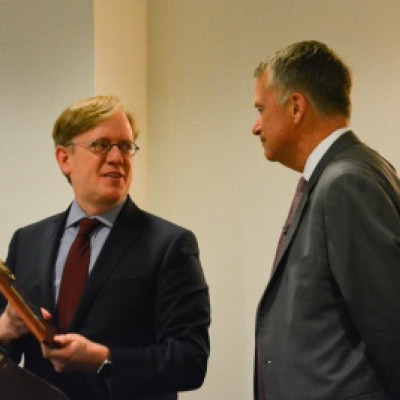March 10, 2020

The General James Doolittle Award Dinner took place on March 5th, 2020, in the Riverfront Room at the Royal Sonesta Boston. This year's honoree was Admiral James A. Winnefeld, Jr.
The General James Doolittle Award Dinner took place on March 5th, 2020, in the Riverfront Room at the Royal Sonesta Boston. The annual dinner commemorates the legacy of James "Jimmy" Doolittle, a US Air Force General, aviation pioneer, and MIT alumnus, who led the Doolittle Raid on Toyko during World War II. Attended by SSP faculty and students, as well as guests from the broader MIT and military community, this year's Doolittle Dinner honored Admiral James A. Winnefeld Jr., who served as the 9th Vice-Chairman of the Joint Chiefs of Staff.
The evening began with a reception, followed by a welcome from SSP Director and Arthur and Ruth Sloan Professor of Political Science, M. Taylor Fravel. Professor Fravel reviewed General Doolittle's life and accomplishments, recounting the events of the famed 1942 raid on Tokyo that he led along with contributions to the development of high octane aviation fuel and space-based reconnaissance. After dinner, Professor Fravel introduced Admiral Winnefeld, who spoke on the need for America to revitalize its approach to military strategy. The Admiral remarked on the global strategic challenges facing the United States, and the need for American policymakers and military planners to properly understand and leverage the nation's "ways, means, and ends” in this shifting security environment. A Q&A session followed, featuring discussions of the current risks posed to the US Navy and Air Force, the long-term costs of maintaining US maritime superiority, and how the scale of US defense expenditures corresponds to threats to core American interests.
In 2017, Pierre (MIT SB 1988) and Amy Chao made a generous pledge to the Security Studies Program in support of the Doolittle Award. Mr. Chao, who has had an active career in the aerospace/defense industry, earned dual Bachelor of Science degrees in Political Science and Management Science from MIT. The endowment will allow SSP to sustain the Doolittle award event, ensuring that future MIT graduate students and fellows are acquainted with the contribution that science and engineering can make to national security.
